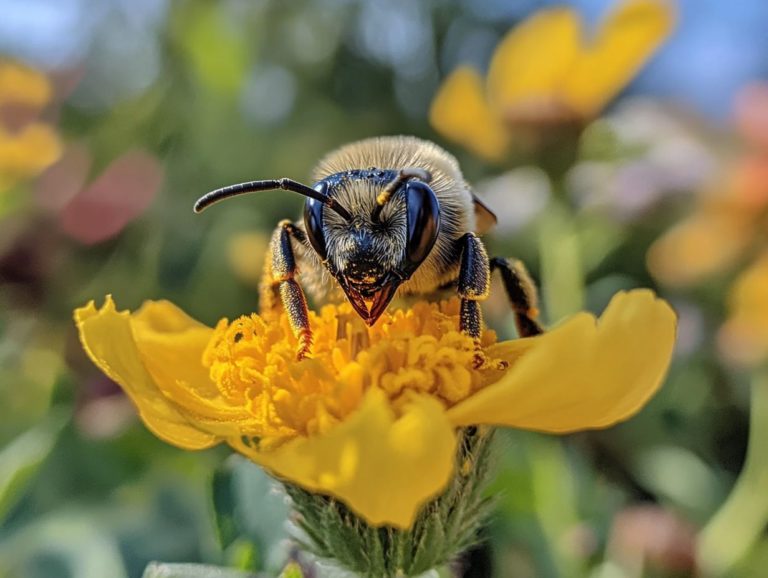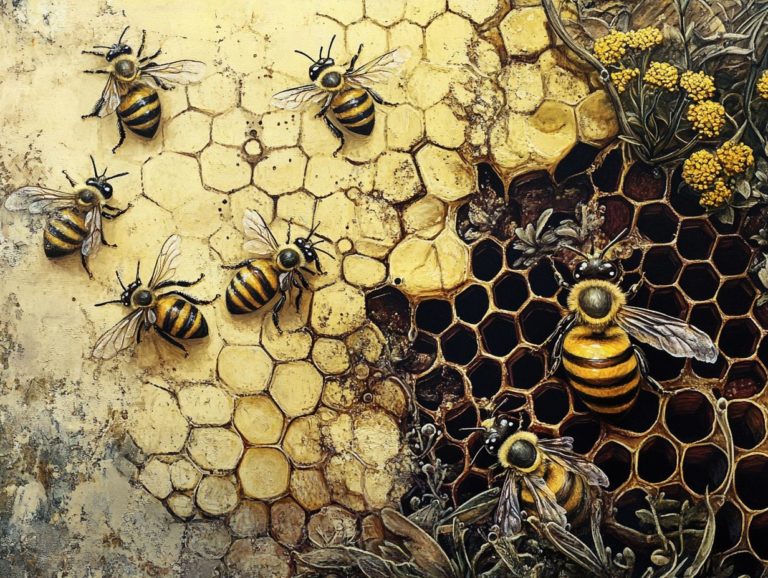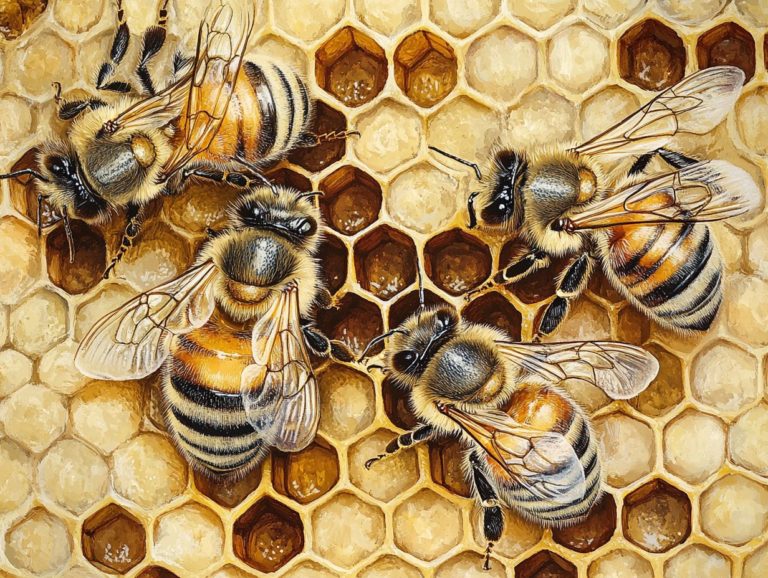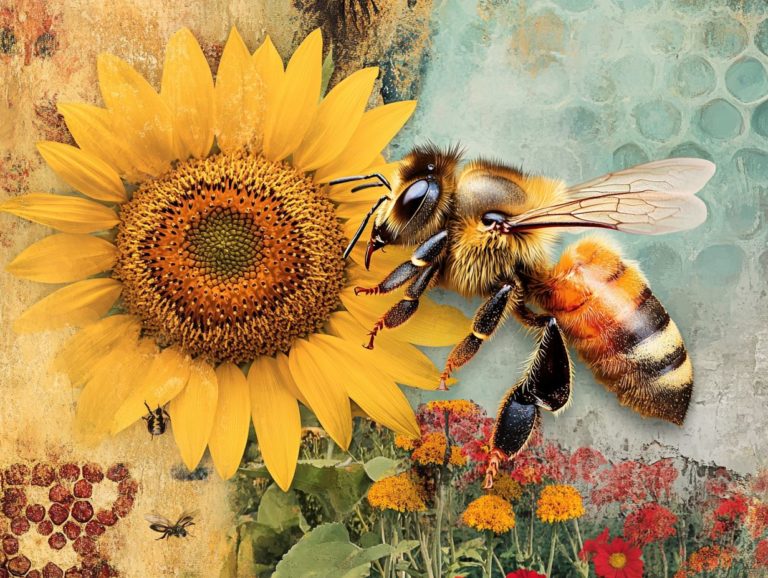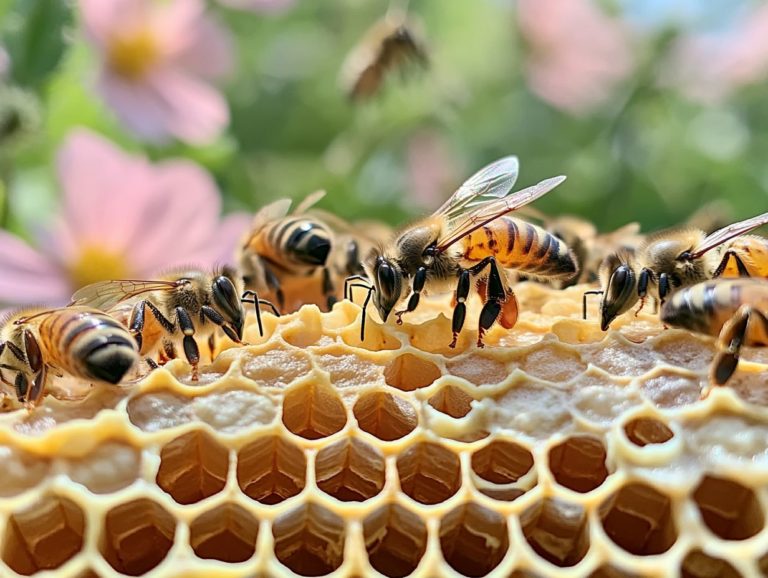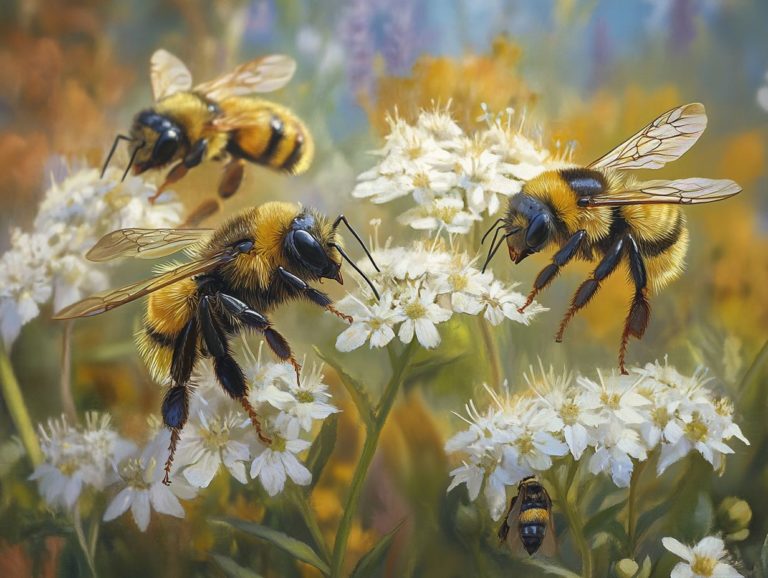The Role of Bees in Global Food Security
Bees are indispensable to the health of our ecosystems and serve as key players in the pollination of numerous crops. As their populations wane due to an array of threats such as climate variability and habitat destruction, this threatens our food production and farming.
This discussion delves into the pivotal role bees play in facilitating pollination. It highlights the significance of their contributions to agriculture, crop diversity, and food security. It underscores the urgent need to safeguard these vital insects.
You are invited to dive into the fascinating connections between bees, sustainable farming, ecosystem resilience, and the global economy, revealing how their well-being directly affects us all.
Contents
- Key Takeaways:
- The Importance of Bees in Pollination
- The Decline of Bee Populations and its Impact on Food Production
- The Importance of Protecting Bee Populations
- The Role of Bees in Sustainable Agriculture
- The Economic Impact of Bees on Global Food Security and Economic Sustainability
- Frequently Asked Questions
- What Is the Role of Bees in Global Food Security?
- How Do Bees Contribute to Global Food Security?
- Why Is Global Food Security Dependent on Bees?
- What Are Some Threats to Bee Populations and Global Food Security?
- What Are the Consequences of Declining Bee Populations for Global Food Security?
- How Can Individuals Help Support Bees and Global Food Security?
Key Takeaways:
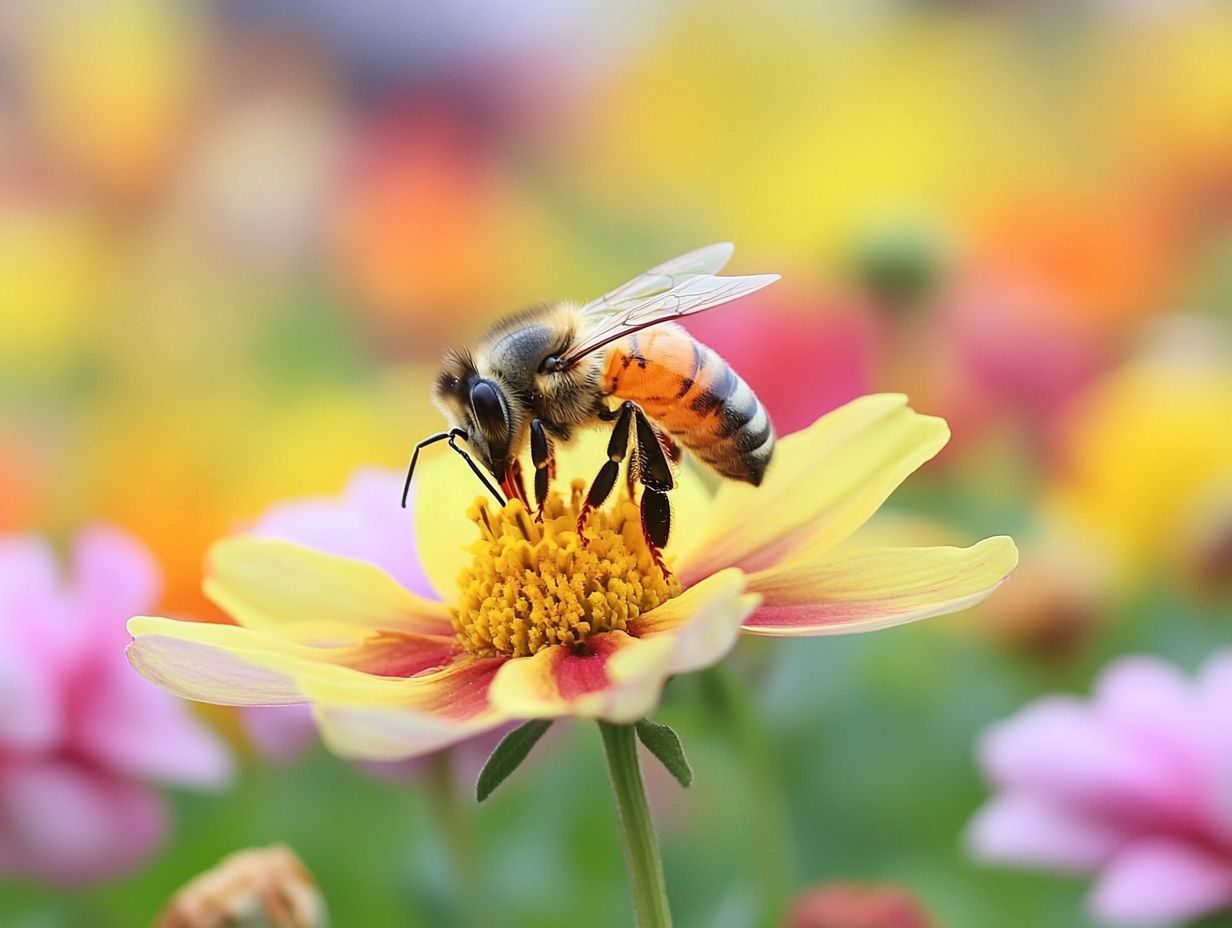
- Bees play a crucial role in global food security by pollinating plants, which is essential for agriculture.
- The decline of bee populations is a major threat to food production, and efforts must be made to protect and preserve them.
- Protecting bee populations benefits food production, contributes to sustainable agriculture, and supports the global economy.
The Importance of Bees in Pollination
In the 21st century, you cannot underestimate the intricate relationship between bees and pollination; it has become essential for sustaining global food systems.
These industrious pollinators are responsible for the reproduction of about 75% of the world s crop species, playing a direct role in food security, biodiversity, and managing nature-based assets.
Without bees, the agricultural practices that underpin humanity’s nutritional well-being and economic stability would experience significant disruptions. This ultimately threatens our collective future, the integrity of ecosystems, and global food security.
How Do Bees Pollinate Plants?
Bees engage in a remarkable process of pollination, transferring pollen from the male anthers of flowers to the female stigma. This is a crucial step for fertilization and fruit production.
This intricate dance unfolds as bees are irresistibly attracted to blooms, lured by the vibrant colors and delightful fragrances of various flowering plants. Nectar plays a pivotal role in this interaction, acting as a tempting reward that encourages bees to visit multiple blossoms, thus enhancing pollination services.
Different species of bees have their own preferences, often gravitating towards flowers with shallow corollas that offer easy access to that sweet nectar. As these industrious pollinators flit from flower to flower, they unwittingly promote cross-pollination, which is the transfer of pollen between different plants and helps produce a wider variety of fruits and vegetables.
This method of pollination not only benefits individual plant species but also supports the broader ecological tapestry, ensuring a balanced, thriving environment and ecosystem functioning.
Why is Pollination Important for Agriculture?
Pollination plays an essential role in agriculture, directly influencing food production and the diversity of crops. It s crucial for ensuring both the quantity and quality of the food supply that underpins global food security.
You cannot underestimate the importance of pollinators like bees, butterflies, and other insects. They are the unsung heroes of the flowering plant kingdom, facilitating reproduction and contributing to a rich agricultural landscape. This diversity supports ecosystems and bolsters resilience against pests and diseases, ultimately enhancing farmers’ livelihoods.
However, the alarming decline in pollinator populations poses a serious threat to these vital services. Reduced yields and a reliance on fewer crop varieties are becoming all too common. This situation puts global food systems and food security at risk.
We must act now to implement conservation efforts before it’s too late!
The Decline of Bee Populations and its Impact on Food Production
The alarming decline in bee populations worldwide has ignited a serious pollinator crisis. This crisis poses dire threats to food production systems and worsens food insecurity, especially in developing countries.
Various factors are contributing to this decline. These include habitat destruction, climate variability, and systemic insecticides like neonicotinoids and fipronil.
This degradation threatens crucial crop species and pollination services. It also puts the nutritional well-being of the global population at risk.
What is Causing the Decline of Bee Populations?
The decline of bee populations is a serious issue. It is driven by habitat destruction from urbanization, harmful insecticides, and significant biodiversity loss.
Urban areas replace wildflowers and native plants with concrete jungles. This change significantly reduces habitats for bees and diminishes their food sources.
Agricultural practices often use systemic insecticides to protect crops. Sadly, these chemicals also harm pollinator populations.
A dedicated group of environmental warriors is stepping up to make a difference. Activists and scientists are creating initiatives like pollinator-friendly gardens and pushing for policy changes to protect bees.
What is Causing the Decline of Bee Populations?
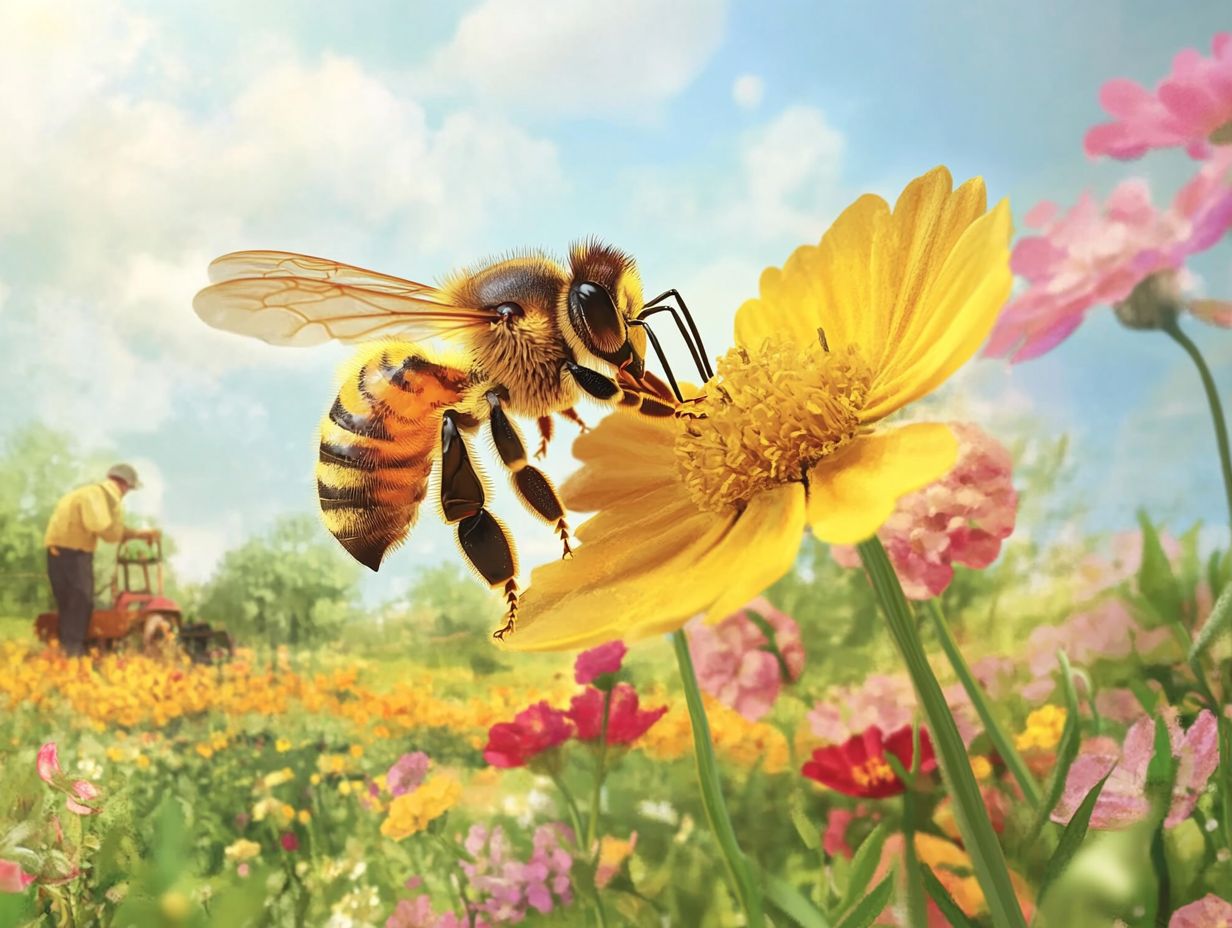
The decline of bee populations is a pressing issue, driven by a multitude of factors such as habitat destruction from urbanization and agricultural expansion, the harmful effects of systemic insecticides, and the worrying loss of plant and animal species. All of these factors threaten the survival of various bee species.
In urban settings, the relentless encroachment of concrete jungles replaces the wildflowers and native plants that bees depend on for sustenance and nesting. This significantly diminishes their habitats. Agricultural practices use systemic insecticides aimed at protecting crops, yet these chemicals inadvertently decimate pollinator populations and mismanage pollination services. The loss of biodiversity worsens these problems. Fewer plant species means fewer food sources for bees.
A passionate group of environmental warriors, including passionate activists and scientists, is stepping up to protect our bees! They are creating initiatives such as pollinator-friendly gardens and advocating for meaningful policy changes to defend these vital species at all costs! Their efforts not only seek to restore bee populations but also illuminate the intricate interconnectedness of ecosystems, underscoring the crucial role every species plays in maintaining ecological balance.
How Does the Decline of Bees Affect Food Production?
The decline in bee populations carries significant implications for food production. Many crops need bees for successful fertilization. This process helps produce important nutrients that people need, sometimes called ‘hidden hunger’ because it can occur even when people are eating enough food.
As these crucial insects face threats from habitat loss, pesticide exposure, and climate change, the ripple effects extend far beyond mere crop yields. Fruits, vegetables, and nuts all essential sources of vitamins and minerals heavily depend on bees for pollination. This is crucial because without bees, our food systems are at risk!
Without a thriving bee population, farmers may struggle to maintain their harvest levels, which could lead to higher prices and reduced access to nutrient-rich foods.
This decline not only endangers agricultural economies and economic sustainability but also poses a serious risk to human health, especially for vulnerable populations who rely on these crops for their daily nutritional needs.
The Importance of Protecting Bee Populations
Protecting bee populations is vital for maintaining biodiversity and fostering sustainable agricultural practices. Bees are essential pollinators that support food production systems globally, playing a critical role in the resilience of ecosystems.
By safeguarding these industrious insects, you contribute not only to the health of your local environment but also to the overall well-being of our planet.
What Steps are Being Taken to Protect Bee Populations?
Several significant steps are being taken globally to protect bee populations. This includes the establishment of international treaties that promote care for pollinators and advocate for sustainable agricultural practices. These treaties aim to minimize the use of harmful insecticides.
In addition to these treaties, various countries are rolling out targeted initiatives. For example, they are creating pollinator habitat corridors. These corridors ensure that bees have access to diverse floral resources throughout their lifecycle.
You ll also find localized programs encouraging organic farming techniques. These techniques focus on reducing chemical inputs and safeguarding surrounding ecosystems and important crops.
Educational campaigns aimed at farmers and the general public are raising awareness about the essential role bees play in food production. Research grants are being allocated to explore innovative strategies that enhance bee resilience against diseases and environmental stressors, such as climate variability.
Your support can make a real difference in saving our bees! Understanding and participating in these initiatives can lead to meaningful change in the fight for bee conservation.
How Can Individuals Help Protect Bees?
You can play a pivotal role in protecting bees by embracing sustainable practices, creating bee-friendly gardens, supporting local diets, and championing a food culture that prioritizes the well-being of pollinators and their habitats.
Supporting beekeeping and honey production can protect bee species and their pollination methods. By taking these steps, you can help cultivate environments where bees thrive.
For example, planting native flowers that bloom at various times throughout the seasons ensures a steady food supply for these vital creatures all year round. Cutting back on pesticide use benefits bees and enhances the overall health of the ecosystem.
Joining local environmental groups can offer you valuable resources and a platform to raise awareness about the crucial importance of pollinators, including bees. Encourage your neighbors to adopt these practices to create a ripple effect. Together, we can transform individual efforts into collective action that significantly impacts bee conservation and our collective future.
The Role of Bees in Sustainable Agriculture
Bees play a pivotal role in sustainable agriculture by harnessing the invaluable services of pollinators. These industrious creatures not only enhance food production but also bolster ecosystem resilience and integrity.
By fostering the delicate balance essential for thriving agricultural systems and biodiversity, you contribute to a healthier environment and the overall functioning of ecosystems.
How Do Bees Contribute to Sustainable Agriculture?
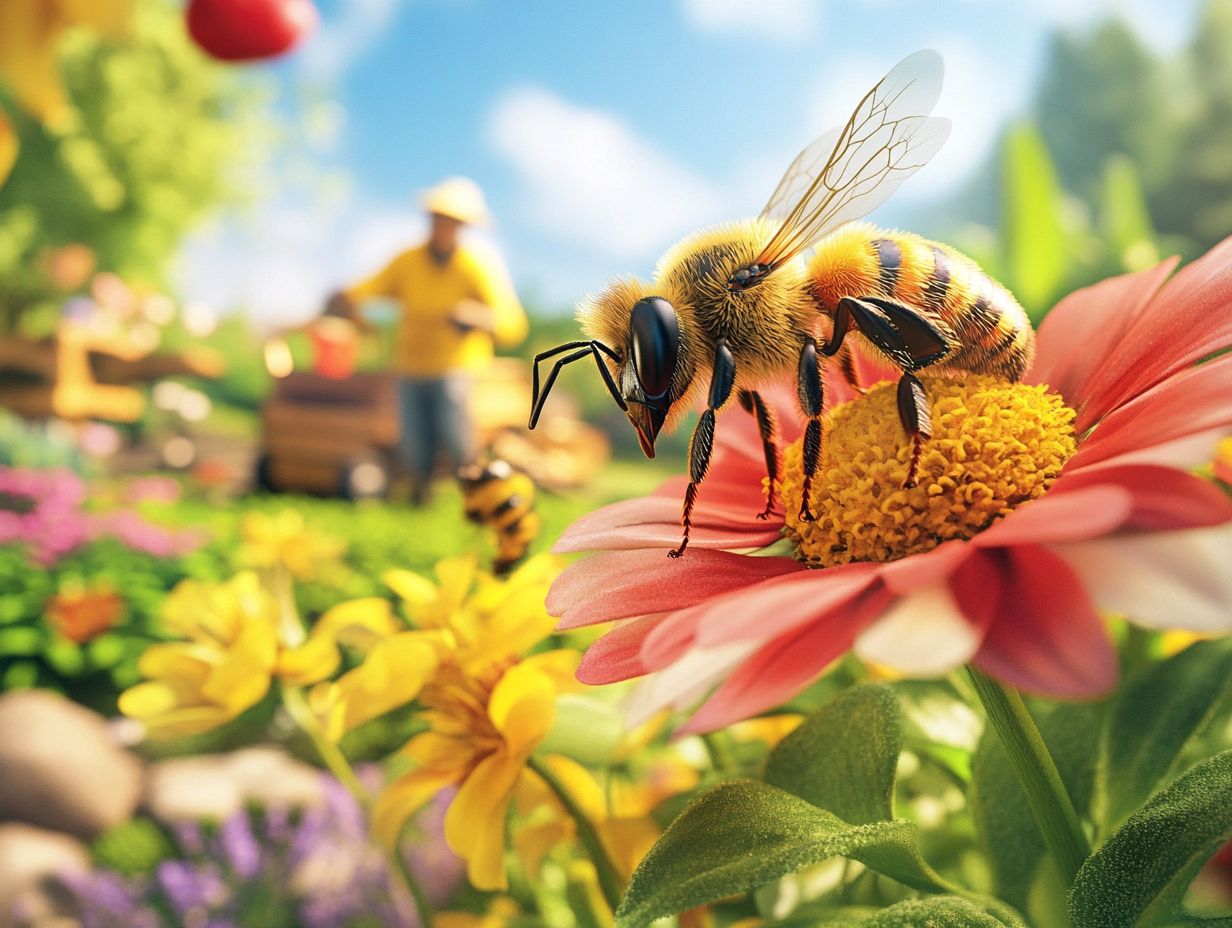
Bees play an essential role in sustainable agriculture through their pollination services. They support a remarkable variety of crops, including fruits, vegetables, and nuts. This vital work ensures that agricultural systems remain productive and resilient, even when faced with challenges like climate variability and habitat destruction.
These industrious insects are not just busy buzzing around; they significantly enhance crop diversity. This diversity boosts yields and fortifies the stability of food systems. By facilitating plant reproduction, bees enable farmers to cultivate a diverse array of fruits, vegetables, and nuts. This ultimately leads to healthier diets and better nutritional well-being for communities.
Moreover, their activities nurture natural habitats, promoting ecological balance and supporting other beneficial organisms. The presence of bees in agricultural landscapes is crucial for achieving long-term food security and economic sustainability. This underscores the pressing need for their conservation as we navigate the ongoing challenges of environmental change and the pollinator crisis.
What are Some Examples of Sustainable Agriculture Practices that Benefit Bees?
Several sustainable agriculture practices greatly benefit bees. These include organic farming techniques, crop rotation, and preserving natural habitats.
These methods enhance biodiversity and support pollinator health. Engaging in organic farming helps avoid harmful pesticides like neonicotinoids, protecting bees from toxic exposure.
Crop rotation prevents soil nutrient depletion. It also creates a vibrant mix of flowering plants throughout the growing season, ensuring bees have continuous forage.
Preserving natural habitats like hedgerows and wildflower strips boosts the ecological value of landscapes. Such areas provide safe spaces for nesting and foraging.
These practices strengthen bee populations. They also enhance the productivity and sustainability of your agricultural operations.
The Economic Impact of Bees on Global Food Security and Economic Sustainability
The economic impact of bees on global food security is remarkable. Their pollination services are crucial for producing a significant share of food worldwide.
This support sustains agricultural economies and countless livelihoods. This is especially true in developing countries, where bees are vital for local food culture and nutrition.
Understanding their importance reveals the connections within our food systems. It also highlights the hidden hunger that can arise from declining pollinator populations.
How Do Bees Contribute to the Global Economy?
Bees play a key role in the global economy. Their essential pollination services boost honey production and promote diverse nutritious crops.
Their ability to pollinate is vital for growing fruits, vegetables, and nuts key components of our diet. This significantly influences market prices.
The honey industry creates numerous jobs, from beekeepers to artisans making honey-infused products. These industrious insects provide extensive benefits to local economies and global food security.
International treaties, like those promoted by the United Nations, emphasize the value of pollinator stewardship. Bees are essential for maintaining ecosystem health.
What Would Happen if Bees Disappeared Completely?
Picture a world without bees what a disaster that would be! The consequences would be catastrophic for food systems globally.
You would see a drastic decline in crop yields, increased food insecurity, and the potential collapse of agricultural economies that rely on pollination. This would severely impact food security in the 21st century.
The absence of bees would set off a chain reaction. This would affect not just the availability of fruits and vegetables, but also the variety of crops in local markets.
Less food variety could lead to nutritional deficiencies, jeopardizing public health and worsening hidden hunger.
As bee populations dwindle, ecosystems would face serious disruption. Plants that rely on bees would struggle to reproduce, leading to decreased biodiversity.
This loss impacts not only crops but also other wildlife dependent on these plants for food. An imbalance in natural habitats would result, deteriorating ecosystems overall.
Frequently Asked Questions
What Is the Role of Bees in Global Food Security?
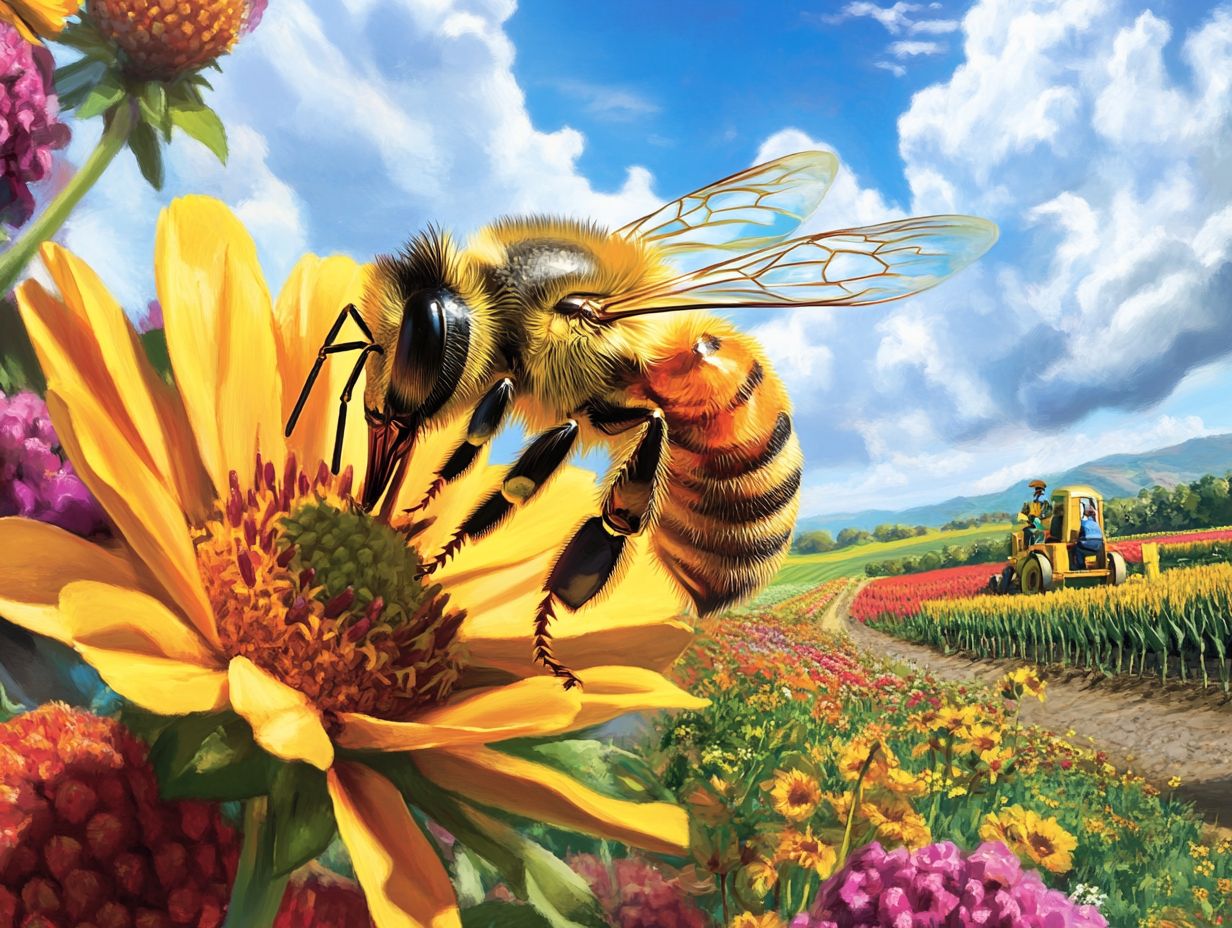
Bees play a crucial role in global food security by pollinating crops. This process allows plants to reproduce and produce food for humans and animals.
Their role in animal pollination ensures that vital nutrients and micronutrients are available in our diet.
How Do Bees Contribute to Global Food Security?
Bees contribute to global food security by pollinating approximately 70% of the world’s crops. This includes fruits, vegetables, nuts, and seeds.
This activity supports local diets and the broader human diet by ensuring crop diversity and availability.
Why Is Global Food Security Dependent on Bees?
Global food security is dependent on bees because, without their pollination services, many crops would struggle to reproduce and produce food for human consumption.
This interconnectedness emphasizes the need for effective pollinator management and stewardship.
What Are Some Threats to Bee Populations and Global Food Security?
Several threats impact bee populations and global food security, including habitat loss and the use of pesticides and herbicides. Diseases, pests, and climate change also pose significant risks.
Mismanagement of agricultural practices and the use of chemicals to control pests further exacerbate the pollinator crisis.
What Are the Consequences of Declining Bee Populations for Global Food Security?
The decline of bee populations has significant consequences for global food security. It can lead to reduced crop diversity and lower crop yields.
This decline threatens the economic value and sustainability of agricultural crops and practices.
How Can Individuals Help Support Bees and Global Food Security?
Individuals can support bees and global food security by planting pollinator-friendly plants and avoiding pesticides and herbicides. Supporting local beekeepers and farmers who practice sustainability is also essential.
Join us in making a difference for our buzzing friends and for our food supply!

